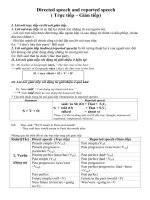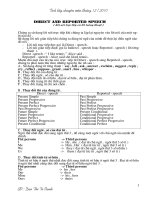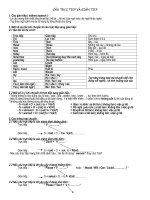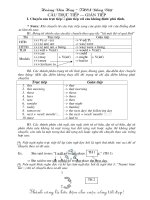Cau truc tiep, gian tiep
Bạn đang xem bản rút gọn của tài liệu. Xem và tải ngay bản đầy đủ của tài liệu tại đây (159.51 KB, 8 trang )
Ii.3. l���i n��i tr���c tiếp/gián tiếp (direct /indirect speech)
1. l���i n��i tr���c tiếp và gián tiếp (direct/ indirect speech)
• Trong câu tr���c tiếp thông tin đi thẳng từ người thứ nhất sang người thứ hai (người thứ nhất
n��i tr���c tiếp với người thứ hai). Trong l���i n��i tr���c tiếp chúng ta ghi
l���i chính xác những từ, ngữ mà người n��i dùng. l���i n��i tr���c tiếp phải được
đặt trong dấu ngoặc kép.
He said “i bought a new motorbike for myself yesterday”.
“i love you”, she said.
• Trong câu gián tiếp, thông tin đi từ người thứ nhất qua người thứ hai đến người thứ ba. Khi đó câu có
biến đổi về mặt ngữ pháp.
He said he had bought a new motorbike for himself the day before.
2. Quy tắc chuyển từ tr���c tiếp sang gián tiếp
2.1. Quy tắc chuyển từ l���i n��i tr���c tiếp sang gián tiếp: lùi một thời
Simple present –> simple past
present progressive –> past progressive
present perfect –> past perfect
Simple past –> past perfect
past progressive –> past perfect progressive
Simple future –> would + V
can/may/must –> could /might/had to
2.2. các chuyển đổi khác:
– Đạ i từ nhân xưng:
i –> he/she
We –> they
You –> i/ we
(tâ n n gữ và tí n h từ sở hữu chuyển theo nhân xưng chủ ngữ)
– tr� �� n g từ chỉ nơi chốn:
Here –> there
This –> that
These –> those
– tr���ng ngữ chỉ thời gian:
Today –> that day
Tomorrow –> the next day/ the following day
Yesterday –> the day before/ the previous day
Last week –> the week before/ the previous week
The day after tomorrow –> in 2 days’ time
The day before yesterday –> two days before.
now –> then
Ago –> before
2.3. các trường hợp không đổi thời
– Sự thật, sự việc luôn luôn đúng:
“The earth moves round the sun” he said.
–> He said that the earth moves round the sun.
– c âu đ i ều k i ệ n loại iI và iIi:
“if i were you, i would leave here” he said.
–> He said that if he were me, he would leave there.
– W i sh + p ast s i m p le/ p ast p erfe c t :
“i wish i lived in Da nang”, he said.
–> He said he wished he lived in Da nang.
– cấu trúc “it’s time somebody did something”:
“it’s time he woke up”, she said.
–> She said it was time he woke up.
– Would/ should/ ought to/ had better/ used to không chuyển:
“ You’d better work hard” he said
–> He said that i had better work hard.
2.4. các cách chuyển đổi cơ bản
A. Say that + a statement –> agree (đồng ý), refuse (từ chối), offer (đề nghị), promise (hứa), threaten +
the infinitive (dọa)
“All right, i’ll help you” he said.
–> He agreed to help me.
“ Oh, no, i won’t come to your party”, he said.
–> He refused to come to my party.
“i’ll look for the cat for you tomorrow if you like” he said.
–> He offered to look after the cat for me the next day if i liked.
“i’ll visit your parents when i arrive there”, he said
–> He promised to visit my parents when he arrived there.
“i’ll sell the TV set if you keep on watching it all day”, said the father
–> The father threatened to sell the TV set if he kept on watching it all day
B. Say that + a statement –> accuse …of (buộc tội), admit (thừa nhận), apologise for (xin l���i),
deny (từ chối), insist on + V-ing (khăng khăng)
“You stole the jewels” said the inspector
–> The inspector accused her of stealing the jewels.
“i’ve made the wall dirty” said one student.
–> One student admitted making the wall dirty.
“i’m sorry i’m late” she said.
–> She apologized for being late.
“no, we didn’t enter the garden” said the boy.
–> The boy denied entering my garden.
“certainly, i’ll buy that car for you”, said he.
–> He insisted on buying me that car.
c. Say to somebody + a statement –> told somebody + that + clause
“i’ve finished all my homework”, he said to me.
–> He told me that he had finished all his homework.
D. Say + a statement –> said that + clause
“i’m going to Hanoi tomorrow”, he said.
–> He said that he was going to Hanoi the next day.
E. Statement with command, request, advice, invitation, offer –> advise, ask, beg, encourage, invite,
order, tell, warn, remind…
“You’d better hurry”, he said.
–> He advised me to hurry.
“post the letter for me, will you?”he said.
–> He asked me to post the letter for him.
“Make another try, please”, he said.
–> He encouraged me to make another try
“Don’t drive too fast”, he said.
–> He warned me not to drive too fast.
“Remember to close the door”, he said.
–> He reminded me to close the door.
“Don’t forget to come at 6 a.m tomorrow”, he said.
–> He reminded to come at 6 a.m the next day.
F. Questions in indirect speech
– Thời, đạ i từ , tí n h từ sở hữu, tr� �� n g từ chuyển như ở câu tường thuật.
– Yes-no questions –> asked/wanted to know if/whether
“Are you absent from your classes today?” he asked.
–> He asked/wanted to know if i was absent from my classes that day.
– Wh-questions –> asked/wanted to know + question word + clause.
“Where do you often meet your friends?” she said.
–> She asked where i often met my friends.
G. Questions with “shall i…”–> 4 loại sau:
• About future event (sự kiện trong tương lai)
“Shall we attend the meeting tomorrow”, she said.
–>She asked if they would attend the meeting the next day
• Request for instruction or advice (l���i hướng dẫn hoặc l���i khuyên)
“Shall i read it, mother?” ha said.
–> He asked his mother if he should read it.
• Offer to do something
“Shall we bring you some new books?” she said.
–> She offered to bring me some new books.
• Suggest to do something
“Shall we go to the cinema tonight”, he said.
–> He suggested going to the cinema that night.
H. Questions with “Will you, would you, could you…?” (yêu cầu, đề nghị, mời)–> offer, invite, order,
ask, told.
“ Will you come to my party tomorrow?” he said.
–> He invited me to come to his party the next day.
“could you get ready at 6p.m tonight?” he said.
–> He told/asked me to get ready at 6p.m that night.
“Would you like some cigarettes?” he said.
–> He offered me some cigarettes.
“Will you shut your mouth?” he said.
–> He ordered me to shut my mouth.
i. Let’s do…–> suggest + V-ing (nếu bao gồm cả người n��i thực hiện hành động)
Let’s do…–> suggest + that S should do…(có thể bao gồm hoặc không bao gồm người n��i thực hiện
hành động)
“Let’s go to the cinema tonight”, he said.
–> He suggested going to the cinema that night. (anh ta cũng đi)
–> He suggested that they should go to the cinema that night
J. Yes, let’s do…–> agree
no, let’s not do… –> be against the idea.
“Let’s eat out tonight” said the mother.
“Yes, let’s” said the son.
“no, let’s not” said the father.
–> The mother suggested eating out that night and the son agreed but the father was against the idea.
K. Must –> had to
“i must finish my work tomorrow”, he said.
–> He said that he had to finish his work the next day.
“Must you go soon?” she said.
–> He asked if i had to go soon.
L. câu cảm thán trong l���i n��i gián tiếp
• What + a + noun! /how + adj
–> said that + clause
–> gave an exclamation of delight (vui mừng, tán thưởng), disgust (kinh tởm), honor (sợ), surprise (ngạc
nhiên)
“How beautiful the picture is”, he said.
–> He said that the picture was beautiful
–> He gave an exclamation of delight.
“What a dirty kitchen!” she said.
–> She said that the kitchen was dirty.
–> She gave an exclamation of disgust.
“How wonderful”, he said.
–> He said that it was wonderful.
–> He gave an exclamation of surprise.
• “Yes/no” –> subject + tr� độ�� ng từ
“Have you finished your homework?”he said
“Yes”, she said
–> He asked her if she had finished her homework and she said she had.
“Are you ready for the exam?” he said.
“no”, she said.
–> He asked if she was ready for the exam and she said she wasn’t.
M. “Thank”–> subject + thanked
“Would you like to have dinner with me tonight?”, he said. “thank you, i’d love to” she said.
–> He invited her to have dinner with him that night. She thanked him and said she would love to.
“Good luck”, he said –> he wished me luck.
“congratulation!”, he said –> he congratulated me.
Bài tập: chuyển những câu sau sang gián tiếp.
1. “Shall i help you with the exercises?” he said.
2. “Shall we give him a birthday cake?” he said.
3. “could i leave early on Friday?” he said.
4. “Where shall we meet tonight?” she said.
5. “Will you have a drink?” he said.
6. “How far is it from here to college?” he said.
7. “Do you often have breakfast at 6.30 a.m?” he said
8. “Don’t swim too far, boys” she said.
9. “Do come in and have a drink” he said.
10. “Remember to wake me up” she said.
11. “if i were you, i would learn English”, she said.
12. “Why don’t we go camping this Sunday?” he said.
13. “Would you like to come to my birthday party next Sunday?” she said.
14. “Let’s have a talk on the new film”, he said.
15. “ Shall i do the cleaning up for you?” he said.
16. “What a clever boy!” she said.
17. “How ugly!” he said.
18. “Did you prepare your meal?” he said. “no” i said.
19. “Happy birthday”, he said.
20. “Take your seat”, he said. “thank”, i said.
Đáp án:
1. He offered to help me with the exercises.
2. He suggested that they should give him a birthday cake.
3. He asked if he could leave early on Friday.
4. She asked where they would meet that night.
5. He offered me a drink.
6. He asked how far it was from there to college.
7. He asked if I often had breakfast at 6.30.
8. She warned the boys not to swim too far.
9. He invited me to come in and have a drink.
10. She reminded me to wake her up.
11. He advised me to learn English.
12. He suggested going camping that Sunday.
13. He invited me to come to his birthday party the following Sunday.
14. He suggested having a talk on the new film.
15. He offered to do the cleaning up for me.
16. She said that the boy was clever.
17. He gave an exclamation of horror.
18. He asked whether I had prepared the meal and I said I hadn’t.
19. He wished me happy birthday.
20. He told me to take my seat and I thanked him.
III.3. Lối nói trực tiếp/gián tiếp (direct /indirect speech)
1. Lối nói trực tiếp và gián tiếp (direct/ indirect speech)
• Trong câu trực tiếp thông tin đi thẳng từ người thứ nhất sang người thứ hai (người thứ nhất nói trực
tiếp với người thứ hai). Trong lời nói trực tiếp chúng ta ghi lại chính xác những từ, ngữ mà người nói
dùng. Lới nói trực tiếp phải được đặt trong dấu ngoặc kép.
He said “I bought a new motorbike for myself yesterday”.
“I love you”, she said.
• Trong câu gián tiếp, thông tin đi từ người thứ nhất qua người thứ hai đến người thứ ba. Khi đó câu có
biến đổi về mặt ngữ pháp.
He said he had bought a new motorbike for himself the day before.
2. Quy tắc chuyển từ trực tiếp sang gián tiếp
2.1. Quy tắc chuyển từ lối nói trực tiếp sang gián tiếp: lùi một thời
Simple present –> simple past
Present progressive –> past progressive
Present perfect –> past perfect
Simple past –> past perfect
Past progressive –> past perfect progressive
Simple future –> would + V
Can/may/must –> could /might/had to
2.2. Các chuyển đổi khác:
– Đại từ nhân xưng:
I –> he/she
We –> they
You –> I/ we
(tân ngữ và tính từ sở hữu chuyển theo nhân xưng chủ ngữ)
– Trạng từ chỉ nơi chốn:
Here –> there
This –> that
These –> those
– Trạng ngữ chỉ thời gian:
Today –> that day
Tomorrow –> the next day/ the following day
Yesterday –> the day before/ the previous day
Last week –> the week before/ the previous week
The day after tomorrow –> in 2 days’ time
The day before yesterday –> two days before.
Now –> then
Ago –> before
2.3. Các trường hợp không đổi thời
– Sự thật, sự việc luôn luôn đúng:
“The earth moves round the sun” he said.
–> He said that the earth moves round the sun.
– Câu điều kiện loại II và III:
“If I were you, I would leave here” he said.
–> He said that if he were me, he would leave there.
– Wish + past simple/ past perfect:
“I wish I lived in Da Nang”, he said.
–> He said he wished he lived in Da Nang.
– Cấu trúc “it’s time somebody did something”:
“It’s time he woke up”, she said.
–> She said it was time he woke up.
– Would/ should/ ought to/ had better/ used to không chuyển:
“ You’d better work hard” he said
–> He said that I had better work hard.
2.4. Các cách chuyển đổi cơ bản
A. Say that + a statement –> agree (đồng ý), refuse (từ chối), offer (đề nghị), promise (hứa), threaten +
the infinitive (dọa)
“All right, I’ll help you” he said.
–> He agreed to help me.
“ Oh, no, I won’t come to your party”, he said.
–> He refused to come to my party.
“I’ll look for the cat for you tomorrow if you like” he said.
–> He offered to look after the cat for me the next day if I liked.
“I’ll visit your parents when I arrive there”, he said









